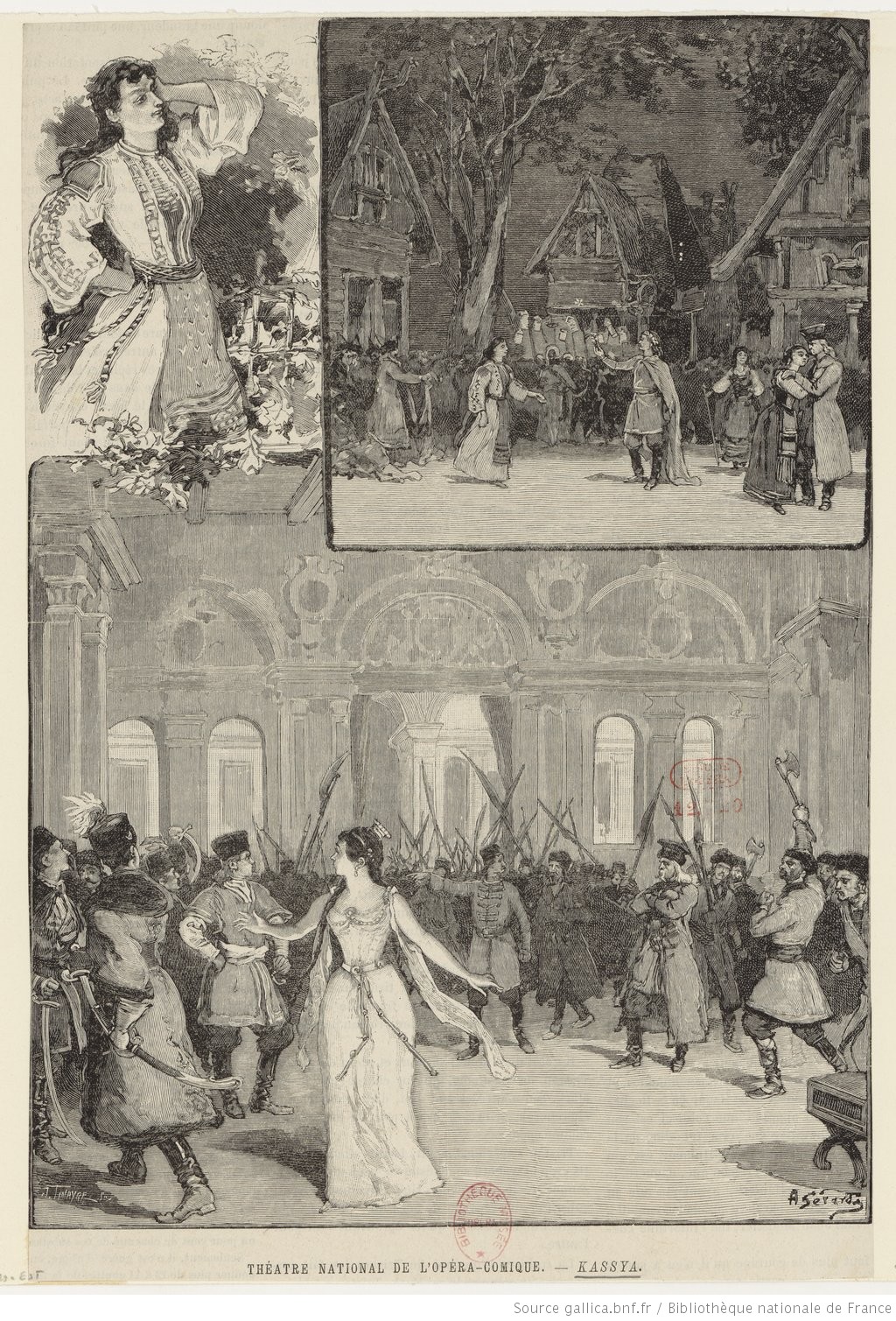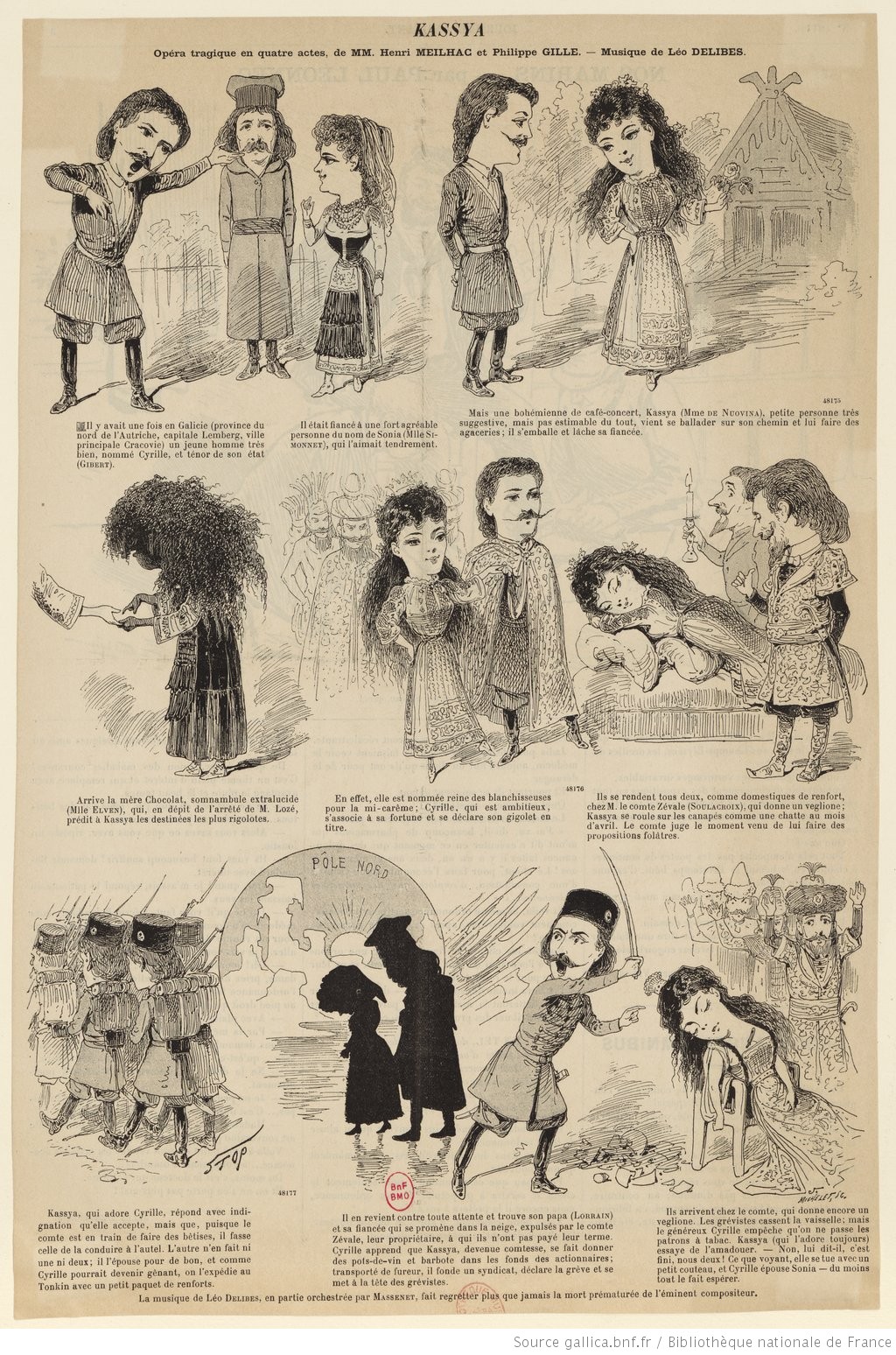KASSYA
- Opéra in 4 actes and 5 tableaux
- Composer: Léo Delibes, completed and orchestrated by Jules Massenet
- Librettists: Henri Meilhac & Philippe Gille, after a short story by Leopold von Sacher-Masoch
- First performed: Théâtre National de l’Opéra-Comique (salle du Châtelet), Paris, 24 March 1893, conducted by Jules Danbé.
(Check out Phil’s review)
| KASSYA, gypsy, 20 years old | Soprano | Mme de Nuovina |
| SONIA, peasant girl, 18 years old | Soprano | Mme Simonnet |
| Une BOHÉMIENNE (A Gypsy Woman), fortuneteller | Mezzo | Suzanne Elven |
| CYRILLE, young peasant, 25 years old | Tenor | M. Gibert |
| LE COMTE DE ZEVALE, 30 years old | Baritone | Soulacroix |
| KOTSKA, old peasant, Cyrille’s father | Bass | Lorrain |
| KOLÉNOTI, Comte’s steward, 40 years old | Baritone | Chalet |
| MOCTOU, innkeeper | Bernaert | |
| A recruiting SERGEANT | Artus | |
| A DRINKER | Troy | |
| Peasant woman | Soprano | Mme Robert |
| Peasant woman | Contralto | Mme Delorn |
| Peasants, Drinkers, Magi and Shepherds, Jewish Merchants, Soldiers, Messengers, Lords and Ladies, Gypsy Musicians, Dancers, Gypsies | Chorus |
SETTING: Galicia [border of modern-day Poland and Ukraine], 1846
Here is an opera to warm the heart! Class war in Eastern Europe; a proletariat hero; a peasants’ revolution; the nobility banished; the violent death of a woman seduced by luxury; and happiness in a humble cottage – all inspired by the inventor of masochism.
Léo Delibes is best known for Lakmé (1883), his grittily realistic exposé of the Imperialist atrocities of the British Raj. (The opera also sheds an interesting light on the chemical properties of certain Indian plants.)

Kassya, Delibes’ last work, is even gloomier: a dark work about oppression and power.
It sank like a fish, and vanished for 115 years – until resurrected last week.
Based on the stories of Leopold Sacher-Masoch (who enjoyed being tormented by women in furs), Kassya takes place in Eastern Europe, an area the composer knew well.
He had visited the Carpathian mountains in the summer of 1885, in the company of the explorer Ferdinand de Lesseps, and studied the music of the region.
The opera, with a libretto by the authors of Carmen and Manon, was originally announced for the 1887-88 season of the Opéra-Comique. When the salle Favart caught fire on 25 May, Kassya was put on the back burner. (So to speak.)
Delibes died in January 1891, leaving the opera unfinished. He had written the piano/vocal score, but had only orchestrated the first act.
His colleague Jules Massenet, also on that trip east, completed the work, and turned the spoken dialogues into sung recitatives.
Despite the opera’s long gestation, it was not a success, and left the theatre after eight performances.
“The drama,” Arthur Pougin (Dictionnaire des opéras) wrote, “was colourful and picturesque, but the character was rather sombre, the tone rather violent, and the story not interesting enough.
“It was like a series of curious, animated, sometimes strange pictures, connected by a somewhat timid and tenuous story.
“This was a blow to the success of the work, which, from the musical point of view, contained pages worthy of the author of Lakmé and Le Roi l’a dit.”
Kassya was forgotten until performed in a concert version in Montpellier a week ago, with Véronique Gens and Cyrille Dubois, conducted by Michael Schønwandt.
This recording is available here: https://www.francemusique.fr/emissions/le-concert-du-soir/kassya-l-opera-inacheve-au-festival-radio-france-occitanie-montpellier-63444
 ACT I: A public square in the village of Zevale
ACT I: A public square in the village of Zevale
The little Galician village is about to hold its Christmas fair. Cyrille, a young peasant, has been chosen to play one of the three Magi, apparently as a reward for seeing off rascals. Cyrille loves the gypsy girl Kassya, and is in turn loved by the peasant Sonia. A gypsy fortuneteller predicts honour and fortune for Kassya, and a humble life but happiness for Sonia. Cyrille names Kassya his Queen of the Fair – much to Sonia’s dismay.
- Cyrille’s recit: “C’était là-bas sous les aulnaies”
- Finale – andante: “Salut, fleur d’Occident”
ACT II: A room in the Count of Zevale’s castle
The Count is also in love with Kassya. He tries to seduce her, but she holds out for marriage. While helping Cyrille hang up garlands, she tells him of the Count’s offer. Cyrille jealously threatens her with a hammer, but she tells him she loves him. The Count (a nasty piece of work) pressgangs Cyrille into the army, to the amusement of his noble cronies. Kassya begs the Count to spare him, but he’s adamant. She yields to his offer of marriage, but hears the soldiers marching off…
- Kassya’s (short!) Chanson slave: “O Nadja, dit le seigneur”
- The Duo de l’échelle
- Finale – Kassya’s prayer: “Je ne menace plus, j’implore”
ACT III: The edge of a forest
Two years later, in the middle of winter. The Count and his new Countess (Kassya) Cyrille’s father terrorise the poor; they plunder, they crush, they extort, and they leave the peasants nothing. Cyrille’s father Kotska has been driven out of his home, accompanied by the ever-loyal Sonia. The pair are reunited with Cyrille, returning home with the army. Cyrille leads a peasants’ revolt, and marches on the castle.
- Choeur des Frileuses (shivering women): “Rentrons au logis”, with a lovely little soprano / mezzo-soprano duet
- Sonia’s Air de l’Hirondelle: “Il suffit d’attendre”
- Trio: “Cette douleur est trop amère”
- The Finale: “Marchez, fauchez, que l’herbe tombe”
ACT IV: A large room in the Castle of Zevale
The aristocrats, unaware Nemesis is approaching, celebrate in the castle. They dance a polonaise; Kassya sings a dumka; and they watch a ballet (obertas; Ruthenian dance; sumka; trepak). The peasants burst in, baying for blood. Cyrille stops them from killing the Count and Countess, who are banished.
ACT V: Kotska’s cabin
Cyrille will marry Sonia. Kassya pleads with him to love her; despairing, she stabs herself. The fortuneteller’s prophecy has come true.
While the opera isn’t Lakmé, there’s much to enjoy.
It’s full of strong situations: a hero drafted into the army by his powerful rival; a woman torn between love and her desire for power and wealth; and a popular uprising, in the middle of a snowstorm.
(Revolts were a fixture of French opera since Guillaume Tell – see also Auber‘s Muette de Portici, with volcano; Meyerbeer’s Prophète, with Anabaptist sermon and rising sun; Paladilhe‘s Patrie!; and Lalo‘s Jacquerie.)
There’s nothing quite on the earworm level of the Flower Duet or the Bell Song, but the score is elegant, often suave, sometimes menacing and powerful. The highlights include the Ladder Duet in Act II, the soldiers’ chorus, and Kassya’s moving prayer; in Act III, the chorus of shivering women (Pougin considered it the pearl of the score), Sonia’s Air de l’hirondelle (Pougin: “exquisite”), and the rousing of the peasants, waving sickles! The last act has a gripping confrontational duet, ending in Kassya’s suicide.
Listen to
Véronique Gens (Kassya), Cyrille Dubois (Cyrille), Anne-Catherine Gillet (Sonia), and Alexandre Duhamel (Le Comte de Zevale), with the Orchestre and Choeur Opéra national Montpellier Occitanie and the Choeur de la Radio Lettone conducted by Michael Schønwandt. Montpellier, July 2018.
You know having looked over the vocal score I find it rather blurry if Cyrille is rewarded with being one of the Wise Men for service to the Comte or for bravely defending the villagers against the bandits whose drinking chorus opens the opera. But yet again, why are they still in the village? After all, it is the villagers who promise Cyrille the one “anything” promise which he uses to save Kassya and the Comte from getting their heads cut off by those Marxist villagers.
LikeLiked by 1 person
You’re right!
INNKEEPER: On vient le complimenter d’avoir, par son courage, su mâter des gredins!
CYRILLE: J’ai défendu le faible qu’on outrage. Ce que j’ai fait, chacun l’aurait fait comme moi.
VILLAGERS: Alors que nous manquait la justice du maître tu t’es fait notre protecteur.
Contre le malfaiteur, le voleur et le traitre, Tu t’es dressé comme un vengeur !
LikeLike
Sir Denis Forman is rolling in his grave: I am certain you would give Lakme (his detested gamma opera par excellence) five stars out of five! Personally I’m sort of in the middle on Lakme, I like it and it has some extremely memorable tunes (I have three recordings of it), but I get what he said about the music being more like musical theatre with short melodies and I treated Kassya in the same way, which it probably doesn’t deserve (except on the brevity issue, darn that Chanson slave!). Interesting social critique though, for both operas! I liked the reference to Nemesis! I may revise my review again, but I find SO much of this score to be sedate and often quiet, but like I even admitted in my first posting, there are some good things and obviously Delibes definitely did his research on finding Eastern European melodies. If I look at it as an Eastern European Lakme it starts to make sense a lot, and Delibes definitely had a stronger cultural grasp on Galicia than he did India. You probably have a stronger ear for French opera than I do. Also, I wish they would have done all of act five: Sonya’s second “Melodie” (which is apparently Delibes for “I don’t want to write an aria when it calls for one”) and that bridal chorus would have been interesting instead of the long duet and then brief trio we get for the last scene. The rest of the score was basically done without cuts, but oh well. Thanks for doing this, it might help me out with my own slump of a review.
LikeLike
Forman would already disapprove; I like Meyerbeer more than the Ring!
I’ve seen Lakmé live, and it’s delightful. A charming tragedy! (O Dourga!) So, yup, probably a five-starrer!
Yes, I wish they’d recorded the whole thing! (I also wish they’d recorded the gondoliers’ chorus in La reine de Chypre – one of the hits of the opera, often encored!)
LikeLike
You know Sacher-Masoch was an interesting figure. He might have been crazy but he championed counter-anti-semitism in Saxony as well as women’s education and suffrage. But yes, the furs!
LikeLike
Yes, I looked him up on Wikipedia.
LikeLike
The next one, by the way, will be an Indian opera…
LikeLike
This is a little obvious, you are in your Delibes frame of mind now…. Either that or it is Pecheurs although that is technically Ceylon and not India. Oh, and I revised my review of Kassya. Eight two-star items, and my comments are nicer. I don’t know if it matters at this point but I raised it to a beta. I’m not in love with this opera, but I think I prefer it to La Reine de Chypre. It is an interesting choice of setting (Galicia), overall.
LikeLike
By the way, did you come up with the PSDFA?
LikeLike